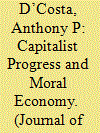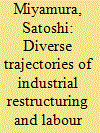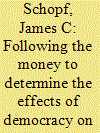| Srl | Item |
| 1 |
ID:
183686


|
|
|
|
|
| Summary/Abstract |
Capitalist progress implies the destruction of the old and uncompetitive sectors and the creation of new ones in their wake. However, in the Global South the loss of jobs in the older sectors is not necessarily offset by the new forms of employment. The objective of this paper is to critically examine how the vast employment in the Indian handloom sector could be sustained, given the competitive pressures from alternative technologies and products. Rather than allow the sector to be a victim of capitalist progress, this paper on moral economy grounds offers an alternative approach, which is to boost the demand for handloom products through commercial branding but one that is rooted in cultural valorization of artisanal craft. This strategy, complementary to state provisioning of subsidized inputs, comes at the expense of authenticity but is expected to enhance consumption and sustain livelihoods in the handloom sector.
|
|
|
|
|
|
|
|
|
|
|
|
|
|
|
|
| 2 |
ID:
148276


|
|
|
|
|
| Summary/Abstract |
It is often claimed that industrial restructuring leads to diminished roles for trade unionism and other forms of labour organisations by informalising employment and relocating production. Drawing on selected case studies from long-term fieldwork in regions of India, this article shows that trajectories of industrial restructuring and the responses by organised labour over the past two decades have been diverse. It is argued that the diverse response not only reflects structural opportunities and constraints for labour to be organised in particular ways, but also different histories and experiences of labour association. Contrary to the presumption about the general demise of trade unionism and the apparent unattainability of class solidarity in contemporary globalised capitalism, it is observed that India’s labour movement is experiencing a degree of resurgence, and new forms of labour organisations and activism are emerging, especially involving informal workers in the formal sector. That these innovative forms of mobilisation are shaped by experiences and aspirations that do not conform to the established institutionalised frameworks for dispute resolution has important policy and political implications.
|
|
|
|
|
|
|
|
|
|
|
|
|
|
|
|
| 3 |
ID:
102757


|
|
|
| 4 |
ID:
109972


|
|
|
|
|
| Publication |
2011.
|
| Summary/Abstract |
This lecture addresses the connection between the production in the present of particular memories of the past and the ability to frame present-day conflicts in ways that render certain possibilities legitimate while excluding others. Through the ethnographic material I have gathered during my career I will show how different projects of the future (personal and collective) appeal to memories of conflict that link responsibilities and generations at different scales. Taking as my object of observation the transformations in economic relations in a heavy industrial region of northwestern Spain I will trace the connections between the languages and practices of contention, the reconfigured structures of production and governance, and the production of diverse memories (and silences) of conflict. Diverse memories produce struggles framed in class terms, or struggles framed in terms of corporatist interests, or in terms of contingently defined social claims. Through this often ambivalent delimitation of conflicts between past and present, the field of possible futures gets configured and with it the spectrum of possible political action.
|
|
|
|
|
|
|
|
|
|
|
|
|
|
|
|